Pay Free Blackjack
| Term | Definition |
|---|
| Bust | A hand in blackjack that goes over twenty-one. If you bust you lose. |
| Double | Allows you to double your initial wager. The bet is placed after the first two cards are dealt. Only double your bet when you are reasonably sure you will only need one more card to win. Your bet will be placed automatically and you will be dealt one last card. Your hand will always consist of only three cards when doubling. Also known as doubling down. |
| Face-up card | The card in the dealer's hand that is face up for you to see before you play your hand. Also known as open card or up card. |
| Hard hand | Any hand that does not contain an ace. Or a hand that contains one or more aces that count as only one point. |
| Hit | To ask the dealer for another card. |
| Insurance | A side bet that equals half of the original wager. Insurance gives you a chance to protect yourself from the dealer's Blackjack. If the dealer's card is an ace, there is the possibility of blackjack. When this happens you will be asked whether you would like to buy insurance. If you believe the dealer has blackjack, you can buy insurance to protect yourself. If the dealer gets blackjack, the insurance will pay 2:1, which equals your original bet. If you have insured yourself and the dealer does not obtain blackjack, then you lose your insurance but retain your original wager. |
| Natural | A two-card hand of 21 points. Sometimes referred to as blackjack. |
| Push | A tie hand between you and the dealer. Occurs when you and the dealer have unbusted hands with the same total points. |
| Soft hand | Any hand that contains an ace that can be counted as 11. For example, an ace and a 6 is called a soft 17. |
| Split | If you are dealt two cards of identical value you can split them into two new hands of one card each. Each hand would then be played out in turn. You may only split a hand once. The wager placed on each new hand will be equal to the original bet. You may double down on one or both of the new hands. When aces are split, only one card will be dealt to each hand. A split hand resulting in blackjack pays out a ratio of 1:1 rather than the normal 3:2. |
| Stand | Stand is to be satisfied with your hand and refuse another card. |
Blackjack Rules
Blackjack uses a six deck shoe.
The face cards - jack, queen and king, all have a value of 10, aces count as either 1 or 11, and the remaining cards are worth their face value.
If your hand exceeds 21, you bust and automatically lose the hand. If you have the same card total as the dealer, from 17 and up, no one wins and you get your wager back in a push.
The dealer must stand on 17 and above and draw on 16 and below.
If the dealer's face-up card is an ace, you will be asked if you wish to buy insurance.
You Win at Blackjack!
If you get Blackjack (21), the payout is 3:2. If your hand beats the dealer's hand but does not equal 21, the payout is 1:1.
| Hand |
Who wins? |
|---|
| Dealer busts (hand exceeds 21) | Player wins |
| Player's hand is closest to 21 | Player wins |
| Player busts (hand exceeds 21) | Dealer wins |
| Dealer's hand is closest to 21 | Dealer wins |
| Hands are equal or a push is achieved | No loss or gain |
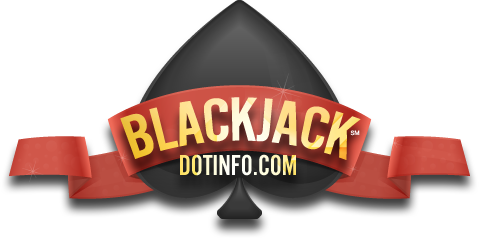
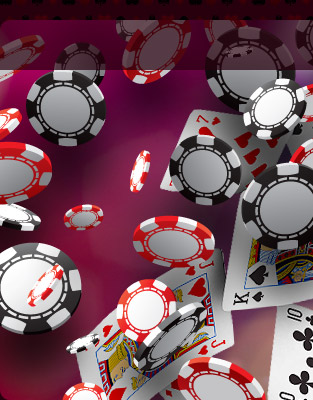
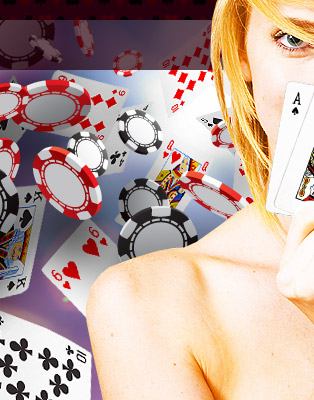
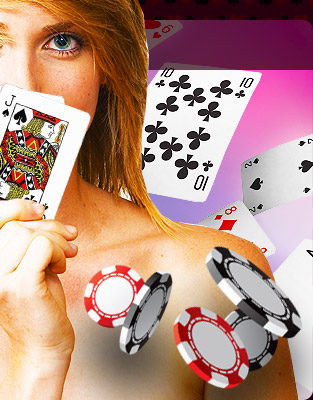
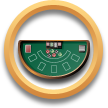 PLAY BLACKJACK NOW The object of Blackjack is to beat the dealer by accumulating a higher score than the dealer without going over 21, or sitting on a lower score and hoping that the dealer "busts"
PLAY BLACKJACK NOW The object of Blackjack is to beat the dealer by accumulating a higher score than the dealer without going over 21, or sitting on a lower score and hoping that the dealer "busts" 
 PLAY BACCARAT NOW Players can wager on the "Player", the "Banker", or a "Tie", while trying to obtain a total card value closest to nine. A third card may be drawn, depending on the hand's value.
PLAY BACCARAT NOW Players can wager on the "Player", the "Banker", or a "Tie", while trying to obtain a total card value closest to nine. A third card may be drawn, depending on the hand's value. 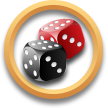 PLAY CRAPS NOW On the first roll, the shooter tries to establish a point with one of the following numbers: 4, 5, 6, 8, 9, 10. If the shooter rolls a 7 or 11, the wager is paid off at even money.
PLAY CRAPS NOW On the first roll, the shooter tries to establish a point with one of the following numbers: 4, 5, 6, 8, 9, 10. If the shooter rolls a 7 or 11, the wager is paid off at even money. 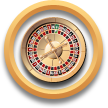 PLAY ROULETTE NOW Players try to determine which number or color the ball will land on. Roulette evolved to include a spinning wheel with 38 numbers and two zeros.
PLAY ROULETTE NOW Players try to determine which number or color the ball will land on. Roulette evolved to include a spinning wheel with 38 numbers and two zeros.